The Best American Science Fiction and Fantasy 2015 Read online
Page 6
He and Mindy would laugh about that together eventually. He wondered what that would be like, to be able to say, “While you were dead.”
Perhaps it would be better just not to bring that up. He couldn’t even begin to imagine what it would be like to live on the other side of that.
“Your present arrived,” his mother said. “It’s very nice.” Her voice was strained.
“You don’t like it?” he said.
“Of course I do,” she said, but he could tell she was lying.
When he went for dinner, he realized the problem.
“They must have shipped you the wrong cat,” he said, looking down at it. It was the same size as Taco and it was a tortoiseshell, but where Taco had been black with dapplings of hazy orange hair, this one was white with awkward splotches of orange and brown.
But the service rep explained. “You can’t clone tortoiseshells and expect the same markings. They’re random expressions of the gene. The brochure lists certain animals where you can’t get an exact copy. Tortoiseshell cats are not refundable.”
He hung up abruptly, full of rage. For God’s sake, he couldn’t get anything right lately.
But that would change when Mindy was back.
He didn’t see the new cat the next time he was over and he didn’t ask questions.
He could understand loving one configuration but not another.
But he didn’t want to think about that.
They sent a crew that went over the house, scanning in everything about it. They quizzed him about the usual state of cleanliness, and what days Mindy usually cleaned on, what she was good at and what she was bad at, and how much they actually split up the chores. Her favorite brands.
He didn’t know many of the answers. How empty did the refrigerator have to get before she’d go shopping, since she was the one who handled all that? He had no idea. They took another tack and asked him what he remembered them running out of, milk or toilet paper or butter.
“You see, most people have a few trigger items that automatically send them to the store,” the data technician chirped at him as she continued running her bar scanner over everything under the sink. She’d quizzed him as to what he purchased and what Mindy had and luckily his only contribution had been a bottle of lime-scented dishwashing soap.
“Have you done many of these before?” he asked.
Her fingers kept clicking over the data pad. She had long thin nails with tiny daggers painted in silver at each tip and a tiny border of circles. “Two so far.”
“What were they like?”
“The first preferred Comet and Pine-Sol, the second went with Seventh Generation cleaning products.”
“No. I meant . . .” He wasn’t sure how to formulate it. “Did it, did it work?”
Her gaze was quizzical. “All I can tell you is that, sure, when they came back they liked the same cleaning brands.” She clicked and swiped. “All right, new section. Bed, made or unmade on a regular basis? If the former, who did it?”
“We did it together every morning,” he said. His eyes heated up and he hoped he wasn’t getting too teary. She tapped away.
“You two were sweet. It will be just as cute in the next round. You’ll see.”
He brought himself to ask his mother what she’d done with the cat. Her hands faltered as she chopped onions, then resumed their staccato beat.
“Mrs. Green two doors down had mice,” she said. “So I loaned her Taco Two.”
“Taco Two? No palindrome?” he asked.
A sizzle and then a wave of fragrance as she added the onions to the skillet. “I couldn’t think of one yet. I’m sure it’ll come to me eventually.”
“Eventually,” he repeated agreeably. He thought perhaps the cat would end up staying with Mrs. Green, but that was all right.
“So what else is new?”
“I’m bringing her home tomorrow.”
She put the spatula down in order to swing around and look at him, wide-eyed. “So soon?”
He nodded. He was smiling again. She smiled back, wiping her hands on her apron before she came over to awkwardly hug him.
What do you bring to your first meeting with the person you used to be married to? He chose an armload of roses. Who cared if it was a cliché? Mindy loved them.
He remembered buying them for her. The two of them together at the farmers’ market, wandering from stall to stall, buying bread rounds still warm from baking and bags of vegetables still thick with dirt and leaves. The way she managed to look at every display, ferreted out everything interesting, made people smile as she talked to them.
Roses. So much like her in the way she opened to the world.
Glimpsed through the pane of glass in the door, she seemed so small in the hospital bed. Her eyes were shut. Her hair had once been long, but now it was short, one or two inches at most.
He said to Dr. Avosh, “Why did you cut her hair?”
The doctor chuckled. “I can see where it would seem that way. But it’s because we’ve had a limited amount of time for her to grow hair in. It’ll come.”
“Won’t that mess with her memories?”
“We’ve compensated.” The doctor put her hand on the gray metal doorknob before looking back over her shoulder at him. “Are you ready to say hello?”
He nodded, unable to speak around the lump in his throat.
The room smelled of lemon disinfectant. The nurse already there took the flowers from him with a muted squeal of delight. “Aren’t these pretty! I’ll put them in water.”
Mindy’s eyes were still shut.
“Are you awake, Mindy?” the doctor said. “You have a visitor.”
Her eyes opened, fixing on him immediately. “Antony.”
The same smile, the same voice.
Emotion pushed him to the bed and he gathered her hands in his, kissing them over and over, before he laid his head down on the cool white hospital sheet and cried for the first time since she died.
He’d asked before what sort of cover story they would have for her waking up in the hospital. Of course they’d thought of that already: a slip in the shower, a knock on the head that accounted for any dizziness or disorientation.
He’d prepared the house as well, made it as close as he could remember to their days together, removed the dingy detritus of a bachelor existence by bringing a cleaning service in. If it seemed too different and she questioned it, he’d tell her that he’d hired the service to help him cope while she was in the hospital.
In the taxi home, as they rumbled their way up Queen Anne, he noticed it.
She didn’t look at the world in the same way anymore. A shrinking back, a momentary flinch, a hesitancy about it all.
He asked the doctor about it the next day. He could tell from her expression that she knew the answer already but was reluctant to say. He pushed harder. “Does it mean something went wrong with the process?”
“Of course not,” Dr. Avosh snapped. She shook her head. “We still don’t understand all the ways that personality is genetically determined.”
“If it’s genetically determined, then it would be the same,” he said.
“It’s considerably more complicated than that,” she said and began to explain, but he was already thinking of tortoiseshell cats and realizing what he had done.
He couldn’t think of anywhere to go but his mother’s.
Much to his surprise, she was sitting on the sofa with Taco on her lap.
“I thought you gave her to Mrs. Green,” he said.
She ran her hand over the soft fur, rubbing around the base of the cat’s ears. He could hear it purring from where he sat. “Just a loan,” she said. “Shall I make us some coffee?”
They sat together, drinking it. The cat hopped back onto his mother’s lap and began to purr again. She patted it.
“She’s more loving, this time around,” she said.
“This time around?”
“Yes.” She shrugged and kept petting
the cat.
“I think Mindy is different this time around, too,” he said.
She looked up, brows furrowed. “Is it possible?”
He nodded at the cat in her lap. “It’s the same thing, as far as I can tell. Personality is random, at least some of it.”
“But she looks just the same.”
He rubbed his forehead with the heel of his hand. “Yes, she does. They took great care in that regard. I wouldn’t be surprised if they used plastic surgery to correct any discrepancies. But they can’t do that with her personality.”
“And you can’t tell her.”
He shook his head.
His mother smoothed her hand over the cat, whispered to it.
“What’s that?” he said.
“Asking her what she makes of this.”
“But you called her something.”
She blushed. “Taco Tooto Cat. Not Taco, but Taco Too.”
Not and yet and still.
Like his Mindy. Who he could finally grieve for. Who he could finally meet for the first time.
“Are you going to pretend?” his mother said.
“No,” he said. “I’m going to tell her. And tell her why she feels about me like she does. Then she can decide.”
“Decide whether or not to keep things as they were?”
“No. Decide whether or not to begin.”
KAREN RUSSELL
The Bad Graft
FROM The New Yorker
I. Germination
The land looked flattened, as if by a rolling pin. All aspects, all directions. On either side of Highway 62, the sand cast up visions of evaporated civilizations, dissolved castles that lay buried under the desert. Any human eye, goggled by a car’s windshield, can graft such fantasies onto the great Mojave. And the girl and the boy in the Dodge Charger were exceptionally farsighted. Mirages rose from the boulders, a flume of dream attached to real rock.
And hadn’t their trip unfolded like a fairy tale? the couple later quizzed each other, recalling that strange day, their first in California, hiking among the enormous apricot boulders of Joshua Tree National Park. The girl had got her period a week early and was feeling woozy; the boy kept bending over to remove a pebble from his shoe, a phantom that he repeatedly failed to find. Neither disclosed these private discomforts. Each wanted the other to have the illusion that they might pause, anywhere, at any moment, and make love. And while both thought this was highly unlikely—not in this heat, not at this hour—the possibility kept bubbling up, every place they touched. This was the only true protection they’d brought with them as they walked deeper into the blue-gold Mojave.
On the day they arrived in Joshua Tree, it was 106 degrees. They had never been to the desert. The boy could scarcely believe the size of the boulders, clustered under the enormous sun like dead red rockets awaiting repair, or the span of the sky, a cheerfully vacant blue dome, the desert’s hallucinatory choreography achieved through stillness, brightness, darkness, distance—and all of this before noon. It was a big day, they agreed. It was a day so huge, in fact, that its real scale would always elude them. Neither understood that a single hour in the desert could mutate their entire future as a couple. In a sense, they will never escape this trail loop near Black Rock Canyon. They had prepared for the hike well, they thought, with granola bars, water, and an anti-UV sunscreen so powerful that its SPF seemed antagonistic. “Albino spring break,” the boy said, rubbing the cream onto her nose. They’d heard about the couple who had died of dehydration six miles from where they were standing. They congratulated themselves on being unusually responsible and believed themselves to be at the start of a long journey, weightless spores blowing west.
The trip was a kind of honeymoon. The boy and girl were eloping. They weren’t married, however, and had already agreed that they never would be—they weren’t that kind of couple. The boy, Andy, was a reader; he said that they were seafarers, wanderers. “Ever unfixed,” a line from Melville, was scraped in red ink across the veins of his arm. The girl, Angie, was three years sober and still struggling to find her mooring on dry land. On their first date they had decided to run away together.
Andy bought a stupidly huge knife; Angie had a tiny magenta flashlight suspended on a gold chain, which she wore around her throat. He was twenty-two, she had just turned twenty-six. Kids were for later, maybe. They could still see the children they had been: their own Popsicle-red smiles haunting them. Still, they’d wanted to celebrate a beginning. And the Mojave was a good place to launch into exile together; already they felt their past lives in Pennsylvania dissolving into rumor, sucked up by the hot sun of California and the perfectly blue solvent of the sky.
They’d been driving for three days; almost nobody knew yet that they were gone. They’d cashed old checks. They’d quit their jobs. Nothing was planned. The rental Dodge Charger had been a real steal, because the boy’s cousin Sewell was a manager at the Zero to Sixty franchise, and because it smelled like decades of cigarettes. Between them they had $950 left now. Less, less, less. At each rest stop, Angie uncapped the ballpoint, did some nauseating accounting. Everything was going pretty fast. By the time they reached Nevada, they had spent more than $800 on gasoline.
Near Palm Springs they stop to eat at a no-name diner and nearly get sick from the shock of oxygen outside the stale sedan. The night before, just outside Albuquerque, they parked behind a barbecue restaurant and slept inside a cloud of meat smells. The experience still has the sizzle of a recent hell in Angie’s memory. Will they do this every night? She wants to believe her boyfriend when he tells her they are gypsies, two moths drunk on light, darting from the flower of one red sunset to the next; but several times she’s dozed off in the passenger seat and awakened from traitorous dreams of her old bedroom, soft pillows.
After dinner Andy drives drowsily, weaving slightly. Sand, sand, sand—all that pulverized time. Eons ago the world’s burst hourglass spilled its contents here; now the years pile and spin, waiting with inhuman patience to be swept into some future ocean. Sand washes right up to the paved road, washes over to the other side in a solid orange current, illuminated by their headlights.
“Who lives way out like that?” Angie says, pointing through the window at a line of trailer homes. Why is the implied question. Thirteen-foot saguaro cacti look like enormous roadside hitchhikers, comical and menacing. Andy is drifting off, his hand on Angie’s bare thigh, when a streak of color crosses the road.
“Jesus! What was that?”
A parade of horned beasts. Just sheep, Angie notes with relief.
Andy watches each animal go from sheep to cloud in the side mirror, reduced immediately into memory. The radio blares songs about other humans’ doomed or lost loves, or their bombastic lusts in progress. Andy watches his girlfriend’s red lips move, mouthing the lyrics to a song Andy didn’t realize he knew. My wife’s lips, he thinks, and feels frightened by the onslaught of an unexpected happiness. Were they serious, coming out here? Were they kidding around? Are they getting more serious? Less? Perhaps they’ll sort it all out at the next rest stop.
That night they stay in a $50 motel. By dawn they are back on the highway. They don’t try to account for their urgency to be gone. Both feel it; neither can resist it.
At 10 a.m., Angie lifts her arm to point at the western sky. There is a pale rainbow arcing over the desert. It looks as if God had made a bad laundry error, mixed his colors with his whites. How could even the rainbow be faded? she wonders.
“Look!” she blurts. “We’re here.”
The sign reads ENTERING JOSHUA TREE NATIONAL PARK.
Quietly they roll under the insubstantial archway of the rainbow. Andy slows the Charger. He wants to record this transition, which feels important. Usually you can only catch the Sasquatch blur of your own legendary moments in the side mirrors.
More and more slowly, they drive into the park. Sand burns outside their windows in every direction. Compass needles spin in their twinned minds
: everywhere they look, they are greeted by horizon, deep gulps of blue. People think of the green pastoral when they think of lovers in nature. Those English poets used the vales and streams to douse their lusts into verse. But the desert offers something that no forest brook or valley ever can: distance. A cloudless rooming house for couples. Skies that will host any visitors’ dreams with the bald hospitality of pure space. In terms of an ecology that can support two lovers in hot pursuit of each other, this is the place; everywhere you look, you’ll find monuments to fevered longing. Craters beg for rain all year long. Moths haunt the succulents, winging sticky pollen from flower to flower.
Near the campground entrance they are met by a blue-eyed man of indeterminate age, a park employee, who comes lunging out of the infernal brightness with whiskery urgency. His feet are so huge that he looks like a jackrabbit, even in boots.
“Where did you folks wash up from?” he asks.
Their answer elicits a grunt.
“First-timers to the park?”
The boy explains that they are on their honeymoon, watches the girl redden with pleasure.
Up close, the ranger has the unnervingly direct gaze and polished bristlecone skin of so many outdoorsmen. A large bee lifts off a cactus, walks the rim of his hat, and he doesn’t flick it off, a show of tolerance that is surely for their benefit.
“Do Warren Peak. Go see the Joshua trees. Watch the yucca moths do their magic. You’re in luck—you’ve come smack in the middle of a pulse event. As far as we can tell, the entire range of Joshuas is in bloom right now. You think you’re in love? The moths are smitten. In all my years, I’ve seen nothing to rival it. It’s a goddamn orgy in the canyon.”
It turns out that their visit has coincided with a tremendous blossoming, one that is occurring all over the Southwest. Highly erotic, the ranger says, with his creepy bachelor smile. A record number of greenish white flowers have erupted out of the Joshuas. Pineapple-huge, they crown every branch.

 The Fireman
The Fireman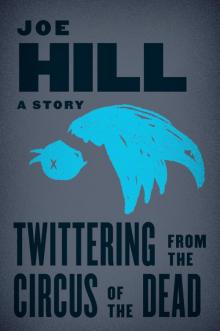 Twittering From the Circus of the Dead
Twittering From the Circus of the Dead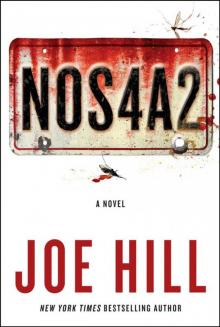 Nos4a2
Nos4a2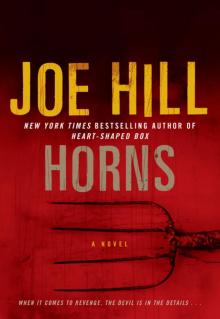 Horns
Horns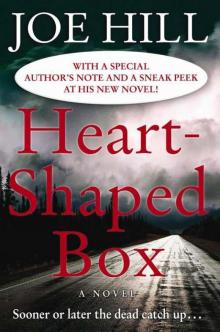 Heart-Shaped Box
Heart-Shaped Box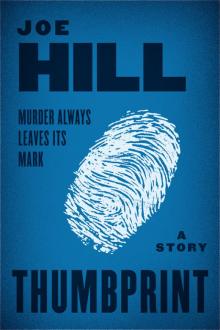 Thumbprint: A Story
Thumbprint: A Story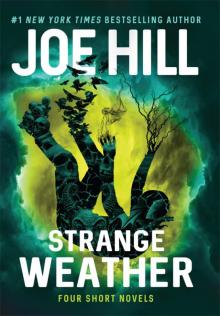 Strange Weather
Strange Weather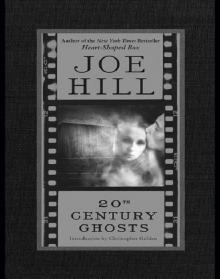 20th Century Ghosts
20th Century Ghosts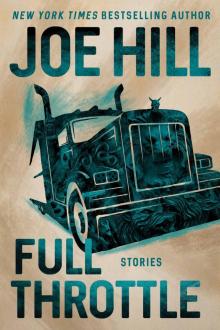 Full Throttle
Full Throttle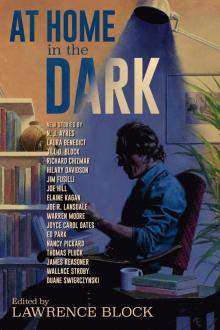 At Home in the Dark
At Home in the Dark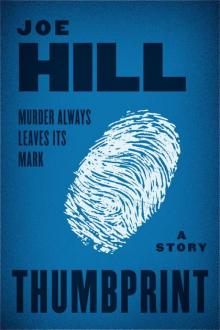 Thumbprint
Thumbprint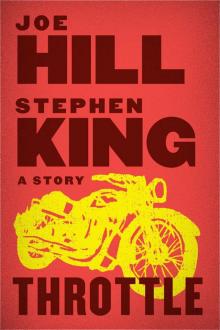 Throttle
Throttle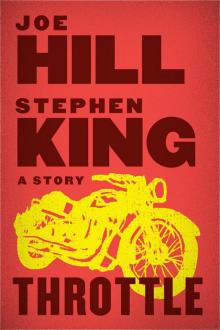 Throttle (Kindle Single)
Throttle (Kindle Single)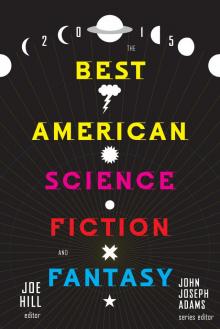 The Best American Science Fiction and Fantasy 2015
The Best American Science Fiction and Fantasy 2015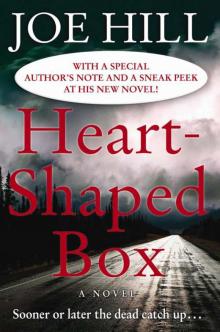 Heart-Shaped Box with Bonus Material
Heart-Shaped Box with Bonus Material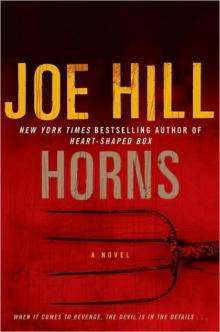 Horns: A Novel
Horns: A Novel